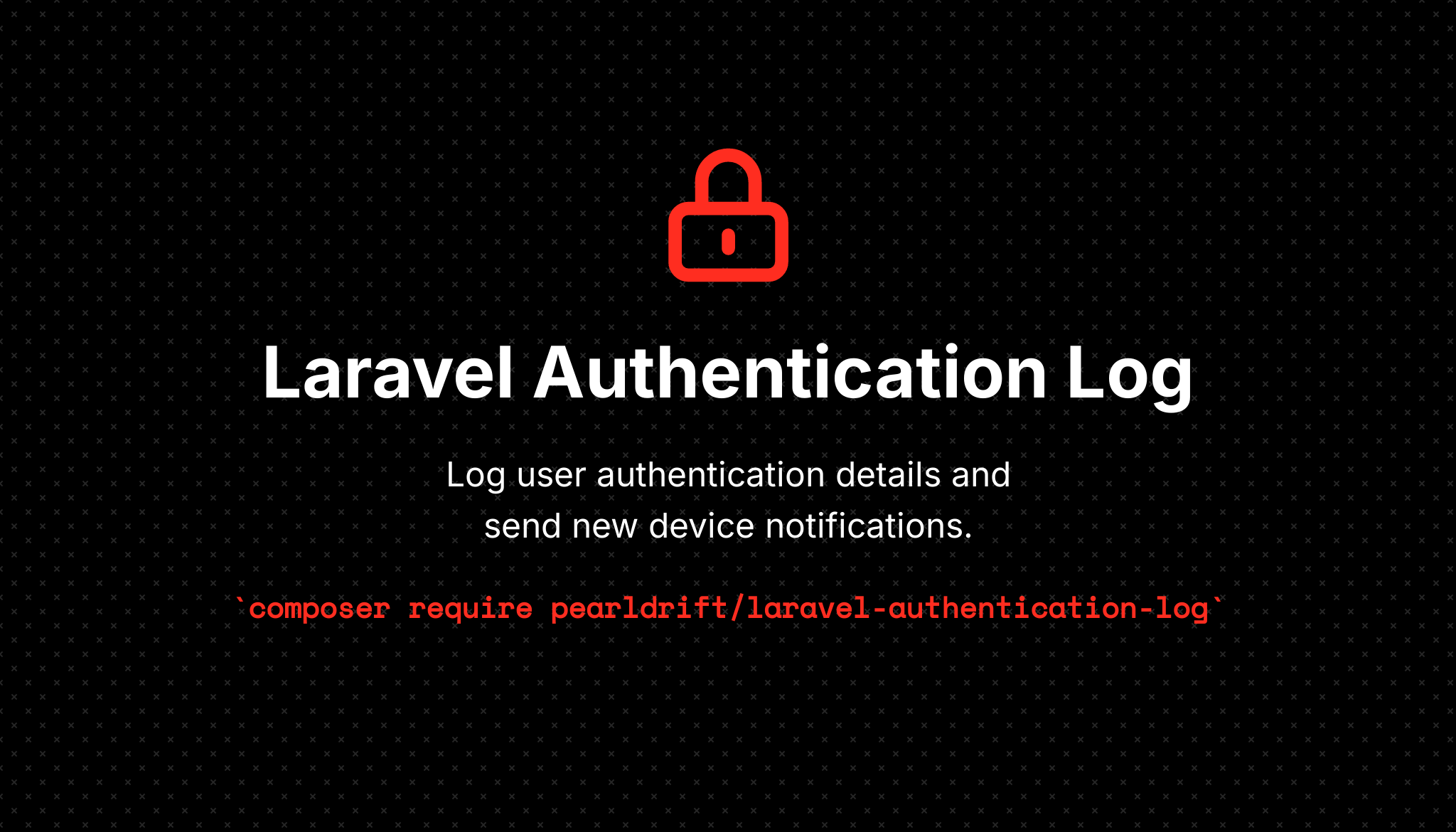Laravel Authentication Log is a package which tracks your user's authentication information such as login/logout time, IP, Browser, Location, etc. as well as sends out notifications via mail, slack, or sms for new devices and failed logins.
Laravel Authentication Log requires Laravel 5.5 or higher, and PHP 7.0+.
You may use Composer to install Laravel Authentication Log into your Laravel project:
composer require pearldrift/laravel-authentication-log
composer require torann/geoip
After installing the Laravel Authentication Log, publish its config, migration and view, using the vendor:publish Artisan command:
php artisan vendor:publish --provider="Pearldrift\LaravelAuthenticationLog\LaravelAuthenticationLogServiceProvider" --tag="authentication-log-migrations"
Next, you need to migrate your database. The Laravel Authentication Log migration will create the table your application needs to store authentication logs:
php artisan migrate
You can publish the view/email files with:
php artisan vendor:publish --provider="Pearldrift\LaravelAuthenticationLog\LaravelAuthenticationLogServiceProvider" --tag="authentication-log-views"
Finally, add the AuthenticationLogable and Notifiable traits to your authenticatable model (by default, App\User model). These traits provides various methods to allow you to get common authentication log data, such as last login time, last login IP address, and set the channels to notify the user when login from a new device:
You can publish the config file with:
php artisan vendor:publish --provider="Pearldrift\LaravelAuthenticationLog\LaravelAuthenticationLogServiceProvider" --tag="authentication-log-config"
This is the contents of the published config file:
return [
// The database table name
// You can change this if the database keys get too long for your driver
'table_name' => 'authentication_log',
// The database connection where the authentication_log table resides. Leave empty to use the default
'db_connection' => null,
// The events the package listens for to log (as of v1.3)
'events' => [
'login' => \Illuminate\Auth\Events\Login::class,
'failed' => \Illuminate\Auth\Events\Failed::class,
'logout' => \Illuminate\Auth\Events\Logout::class,
'logout-other-devices' => \Illuminate\Auth\Events\OtherDeviceLogout::class,
],
'notifications' => [
'new-device' => [
// Send the NewDevice notification
'enabled' => env('NEW_DEVICE_NOTIFICATION', true),
// Use torann/geoip to attempt to get a location
'location' => true,
// The Notification class to send
'template' => \Pearldrift\LaravelAuthenticationLog\Notifications\NewDevice::class,
],
'failed-login' => [
// Send the FailedLogin notification
'enabled' => env('FAILED_LOGIN_NOTIFICATION', false),
// Use torann/geoip to attempt to get a location
'location' => true,
// The Notification class to send
'template' => \Pearldrift\LaravelAuthenticationLog\Notifications\FailedLogin::class,
],
],
// When the clean-up command is run, delete old logs greater than `purge` days
// Don't schedule the clean-up command if you want to keep logs forever.
'purge' => 365,
];
If you installed torann/geoip you should also publish that config file to set your defaults:
php artisan vendor:publish --provider="Torann\GeoIP\GeoIPServiceProvider" --tag=config
You must add the AuthenticationLoggable and Notifiable traits to the models you want to track.
use Illuminate\Notifications\Notifiable;
use Pearldrift\LaravelAuthenticationLog\Traits\AuthenticationLoggable;
use Illuminate\Foundation\Auth\User as Authenticatable;
class User extends Authenticatable
{
use Notifiable, AuthenticationLoggable;
}
The package will listen for Laravel's Login, Logout, Failed, and OtherDeviceLogout events.
If you would like to listen to your own events you may override them in the package config (as of v1.3).
You may notice that Laravel - fires a Login event when the session renews if the user clicked 'remember me' when logging in. This will produce empty login rows each time which is not what we want. The way around this is to fire your own Login event instead of listening for Laravels.
You can create a Login event that takes the user:
<?php
namespace App\Domains\Auth\Events;
use Illuminate\Queue\SerializesModels;
class Login
{
use SerializesModels;
public $user;
public function __construct($user)
{
$this->user = $user;
}
}
Then override it in the package config:
// The events the package listens for to log
'events' => [
'login' => \App\Domains\Auth\Events\Login::class,
...
],
Then call it where you login your user:
event(new Login($user));
Now the package will only register actual login events, and not session re-authentications.
If you are working with Fortify and would like to register your own Login event, you can append a class to the authentication stack:
In FortifyServiceProvider:
Fortify::authenticateThrough(function () {
return array_filter([
...
FireLoginEvent::class,
]);
});
FireLoginEvent is just a class that fires the event:
<?php
namespace App\Domains\Auth\Actions;
use App\Domains\Auth\Events\Login;
class FireLoginEvent
{
public function handle($request, $next)
{
if ($request->user()) {
event(new Login($request->user()));
}
return $next($request);
}
}
composer testPlease see CHANGELOG for more information on what has changed recently.
Please see CONTRIBUTING for details.
Please review our security policy on how to report security vulnerabilities.
The MIT License (MIT). Please see License File for more information.




